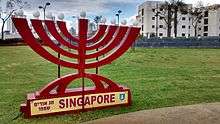Israel–Singapore relations
Israel–Singapore relations are foreign relations between Israel and Singapore. Relations between the two countries are extremely cordial, and they are known to share a Special Relationship. Both countries established diplomatic relations in May 1969.[1] Israel has an embassy in Singapore. Singapore is represented in Israel by a non resident ambassador based in Singapore (in the Foreign Ministry) and through an honorary consulate in Tel Aviv.
 | |
Israel |
Singapore |
|---|---|
The two nations enjoy an extensive security relationship, with Israeli and Singaporean arms industries engaging in joint development and a large level of military trade between the two countries.[2]
History
Following Singapore's expulsion from Malaysia in August 1965, Singapore established full diplomatic relations with Israel. However, Singapore kept the relationship on a low profile for the next thirty years due to its relationship with its Muslim neighbours Malaysia and Indonesia. The Singaporean government modelled the country's armed forces including its national service programme after the Israeli Defense Forces. From 1966, Israeli military advisers were brought in to train the Singaporean military. Israel also supplied Singapore with military hardware including tanks and missiles. In 1968, an Israeli trade office was established in Singapore and subsequently upgraded to embassy status in 1968.[3]
In April 1986, Singapore's Foreign Minister S. Dhanabalan visited Israel. In return, the Israeli President Chaim Herzog visited Singapore in 18–19 November 1986. Herzog's visit triggered angry protests from both the Malaysian and Indonesian governments. The Malaysian government threatened to stop Singapore's water supply across the Johor–Singapore Causeway. Despite this incident, Singaporean–Israeli trade relations continued to expand. By 1991, Israel's trade with Singapore totalled US$79 million in exports and US$43 million in imports. According to Jacob Adabi, Singapore sought to project an image of impartiality towards the Arab-Israeli conflict. While maintaining defense and economic relations with Israel, Singapore endorsed UN Resolutions 242 and 338 in order to balance relations with its Muslim neighbors and the Arab world.[3][4]
In February 2017, the Israeli Prime Minister Benjamin Netanyahu and his wife Sara visited Singapore. He was hosted by the Singaporean Prime Minister Lee Hsien Loong. During the visit, Prime Minister Lee Hsien Loong spoke in favor of a two-state solution to the Israeli–Palestinian conflict. Unlike the 1986 state visit, Netanyahu's presence did not attract opposition from Malaysia and Indonesia.[5] Netanyahu also met with members of the Singaporean Jewish community and visited Maghain Aboth Synagogue.[6]
Agreements
In 2005, the two countries signed a pact to ease the flow of goods and investments between the two countries during a visit to Israel by Singaporean Senior Minister Goh Chok Tong with members of the Israeli Cabinet as well as meeting Israeli Prime Minister, Ariel Sharon.[7] In February 2017, Prime Minister Benjamin Netanyahu became the first Israeli head of government to visit Singapore in 30 years.[8]
Singapore was one of 41 countries that abstained from voting on the Resolution 67/19 on “Status of Palestine in the United Nations” by the United Nations General Assembly on 29 November 2012 which granted Non-Member Observer State status to Palestine. In explaining the reasons for Singapore’s abstention, Senior Minister of State Masagos Zulkifli stated that Singapore believes “that only a negotiated settlement consistent with UN Security Council Resolution 242 can provide the basis for a viable, long term solution” and that “[b]oth sides have legitimate rights and shared responsibilities, and must be prepared to make compromises to achieve the larger good of a lasting peace”.
Cooperation
Prime Minister of Singapore Lee Kuan Yew on the Six-Day War[9]

Business and trade
In 1990, the Singapore-Israel Chamber of Commerce commenced operation.[12]
In 2013, Singapore–Israel trade totalled S$1.956 billion, a 24.6% jump year-on-year from 2012, according to figures from the Embassy of Israel in Singapore and IE Singapore. Singapore is a net importer from Israel, and Israel exports mostly electrical equipment to Singapore, while Singapore exports mostly machinery and computer equipment to Israel.[13]
Military
In January 1968, before diplomatic relations were established, Singapore made an agreement to purchase 72 surplus AMX-13 tanks from Israel.[9] By the 1980s, Singapore had acquired over 350 of these tanks.
During the formative years of the Singapore Armed Forces in the late 1960s, Singapore sought advice and consultation from experienced militaries to form a credible military post-independence. Israel responded and provided doctrine and training development. Due to sensitivities in a Muslim-dominant region, Singapore kept the co-operation low-profile.[14]
Over the years, Israel has continued to advise Singapore on an array of military topics, ranging from night operations to aviation psychology. The defence and intelligence establishments of both countries conduct routine exchanges of information, and a small number of IDF officers serve in staff appointments within MINDEF.[15] In 2012, it was reported that Singapore expressed interest in purchasing several Iron Dome defense system units[16] and a deal took place four years later. Today, the two countries share military platforms, including early warning aircraft, anti-tank and anti-aircraft missile systems, aircraft and surveillance technologies.[17]
Gaza
The Singaporean Government has expressed concern over Palestinian rocket attacks against Israeli civilians. In January 2009, the Singapore Foreign Ministry said of the Gaza War, "This is an extremely disturbing development," that "It can only exacerbate the already grave humanitarian situation." Following the ceasefire, Singapore Foreign Ministry called it a "positive development" but remained "deeply concerned over the humanitarian situation in Gaza and urge all sides to take urgent steps to address the situation".
In July 2014, the Singapore Ministry of Foreign Affairs also issued a statement on the recent murder of the three Israeli teenagers in the West Bank. The statement said: "Singapore strongly condemns the killing of the three Israeli teenagers, who were first abducted on June 12, 2014. We convey our deepest condolences to the families of the victims and the people of Israel. Perpetrators of such heinous crimes must be swiftly brought to justice".[18]
In the 2014 Israel–Gaza conflict, the Minister for Foreign Affairs K. Shanmugam said the Palestinian militant organization Hamas has "deliberately used civilians as (human) shields" and was responsible for rejecting the 15 July 2014 Egyptian proposal for a ceasefire.[19] In the same speech to parliament, he also said that Hamas had been consistently launching rocket attacks at Israel, numbering over 2,000 missiles at one point, and this was what prompted the start of Israel's operation to destroy these rocket-launching sites, the smuggling tunnels and the munitions stockpiles to prevent attacks on Israel civilians.
References
- "Diplomatic Ties With Israel Established by Singapore". The New York Times. 11 May 1969.
- David Donald (14 February 2012), Israel Shows Wares in Singapore, Aviation International News, retrieved 5 March 2012
- Abadi, Jacob (2004). Israel's Quest for Recognition and Acceptance in Asia. London: Frank Cass. pp. 171–190. ISBN 0-7146-8564-X.
- Weill, Asher (January 1987). "The President in the Pacific". Israel Scene: 13–19.
- Jaipragas, Bhavan (25 February 2017). "Netanyahu's drama-free Singapore trip: Are Malaysia, Indonesia finally warming to Israel?". South China Morning Post. Retrieved 23 June 2017.
- Roberts, Chana (20 February 2017). "Netanyahu visits Singapore synagogue". Arutz Sheva. Retrieved 23 June 2017.
- "newspaper archive, clipping service - newspapers and other news sources". NewsLibrary.com. Retrieved 2018-03-07.
- "Israel Prime Minister Netanyahu describes 'battle for the future of humanity' during Singapore visit". CNBC. 20 February 2017.
- A deep, dark, secret love affair, Haaretz Israeli News, 16 Jul 2004, retrieved 29 Jul 2012
- "Singapore confirms new AEW purchase". Flight International.
- "Singapore to Replace Hawkeye With G550 AEW". www.defense-update.com. Archived from the original on 2008-09-05. Retrieved 2012-03-04.
- "Singapore-Israel Chamber of Commerce. (begins operations) (Trade)". ICEN. 28 March 1990.
- http://itrade.gov.il/singapore/2014/01/17/singapore-israel-trade-hits-almost-s2-billion-2013/
- Padilla, Lissette (2018-03-07). "Why Do Israel And Singapore Love Each Other?". Seeker. Retrieved 2018-03-07.
- Tim Huxley, Defending the Lion City: The Armed Forces of Singapore
- Alster, Paul (2012-12-02). "Behind the Iron Dome: Key engineer tells how Israeli defense system saved lives". Fox News. Retrieved 2018-03-07.
- Mittelman, Sharyn (2016-06-06). "Israel and Singapore – out of the shadows". The Jerusalem Post | JPost.com. Retrieved 2018-03-07.
- "Archived copy". Archived from the original on 2014-09-18. Retrieved 2014-09-23.CS1 maint: archived copy as title (link)
- http://www.mfa.gov.sg/content/mfa/media_centre/press_room/pr/2014/201408/press_20140508.printable.html?status=1

